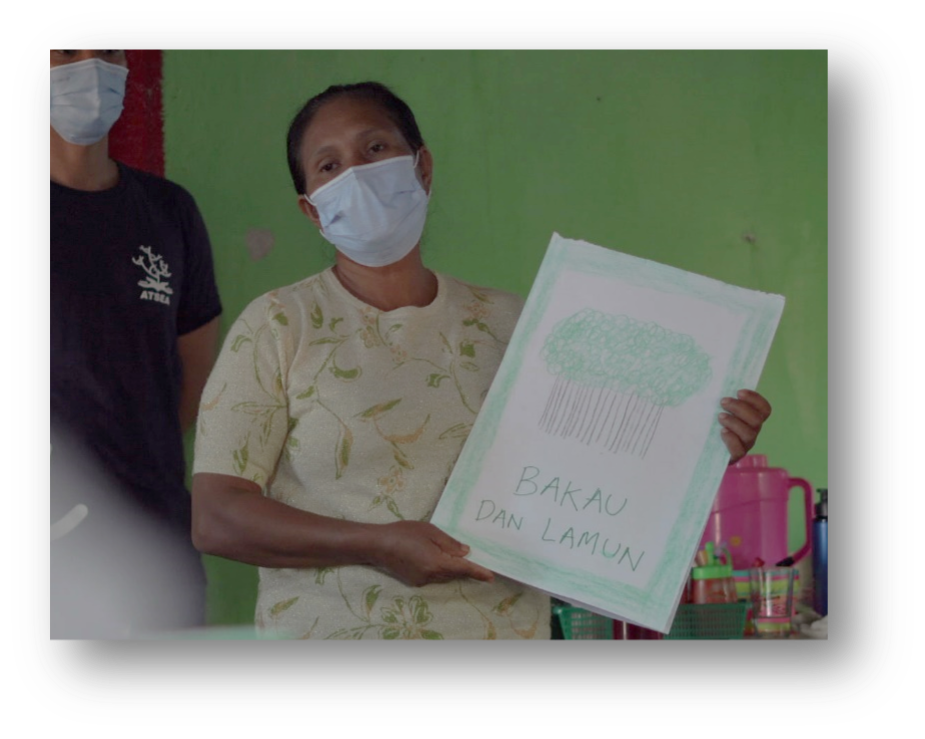Climate change is having an unprecedented impact on people’s lives and livelihoods. This has severe implications for environmental degradation, but also exacerbates the issue of gender inequality in coastal communities that rely on marine and fisheries resources. The Arafura and Timor Seas (ATS) region is one of the areas where such climate variability and its associated socio-economic consequences are most keenly felt.
Working in collaboration with the Indonesian Ministry of Marine Affairs and Fisheries (MMAF), the ATSEA-2 Project conducted a number of gender assessments in 2020 and 2021. The results indicate that inequalities in coastal communities are hindering women’s attempts to cope with the consequences of climate change, while a lack of authority and control over resources is limiting their capacity to escape poverty. A gender survey conducted by the ATSEA-2 Regional Project Management Unit has highlighted several of the main gendered impacts of climatic change. This includes the loss of access to and control over natural resources and ecosystems, sources of income, housing and healthy living conditions.
In Rote Ndao, East Nusa Tenggara, seaweed farming is a family enterprise; women are primarily engaged in pre- and post-farming activities (e.g., seedling preparation, cleaning and segregation, and drying), while men take charge of farm construction, monitoring and harvest. Gender-based segmentation in terms of resource utilisation (i.e., allocation of space and division of labour) have been documented, along with its implications for the socio-economic condition and political representation of both women and men.

ATSEA-2 is working to improve, diversify and develop alternative livelihood activities in the most vulnerable coastal communities of Rote Ndao, in order to alleviate the dependency on diminishing coastal resources, reduce poverty and increase well-being. Affirmative policies and programmes are anticipated, in order to give women more room to exercise their agency and rights; this is combined with essential support for better livelihoods, without disregarding or jeopardising existing inequities in their domestic sphere.
ATSEA-2 has been working closely with a group of women seaweed farmers based in the village of Oeseli in Rote Ndao, helping them to increase their income by utilising abundant local resources such as coconut, seaweed and mangroves. These resources can be converted into lucrative commodities, which have the potential to support family incomes and reduce the local dependence on marine and fisheries resources. Recently, a group comprising 24 women were trained to make Minano soap, which is made from mangrove materials and seaweed. Packaged using environmentally friendly materials, this soap is already being marketed in various locations, such as bungalows and spas in local tourist destinations. Moving forward, this group plans to improve the quality and quantity of their products.
Together with its partners, the ATSEA-2 Project will support these activities, specifically through Corporate Social Responsibility (CSR) activities alongside the Bank Negara Indonesia (BNI) that will address budgeting and capacity building for the project. Through these interventions, ATSEA-2 is empowering local women to engage in productive activities that transcend traditional (reproductive) roles in their families and in their community, while also helping to generate alternative livelihood opportunities that can help to mitigate the impacts of climate change.
A second group, named Dale Esa, has also been established at the eastern edge of Rote Ndao, where local women are utilising abundant mangrove trees to make and process coffee and syrup for sale. The group is made up of 10 women and five men, who work together to sustainably harvest and prepare mangrove syrup. With support from the Yayasan Reef Check Indonesia (YRCI) and the ATSEA-2 Project, this group was established on 17 June 2022. Dale Esa members are mostly based in Daiama, where they recently hosted a first capacity-building training session. The group settled on the brand name “Sehati” for its coffee, while the syrup will be sold under the name “Dosela”.
This group still requires more resources and support in terms of mass production and storage capacity, along with the tools and raw materials they need to make their products. In spite of these limitations, the group has already begun to reap the benefits of all its hard work to date. According to the YRCI Director, several stalls in local tourism areas – including Mulut Seribu, Dekranasda in Kupang and Ba’a – have already seen high demand for the products, with stock quickly selling out. YRCI and ATSEA-2 will continue to support the group with capacity building and training related to business operations, marketing and networking for their products. The introduction of alternative livelihoods to the community has been welcomed in Rote Ndao, especially by women. With just a little training and facilitation, these communities have already begun to produce a variety of unique and valuable products with the potential to provide economic independence for their makers. A similar process will soon be adopted in other villages – such as Nembrala, with coconut oil and coconut syrup – where natural resources provide untapped potential for livelihoods. Support for these groups can dramatically help mitigate the impacts of climate change and lessen coastal communities’ dependence on marine and fisheries resources.
(By Laeli Sukmahayani)


